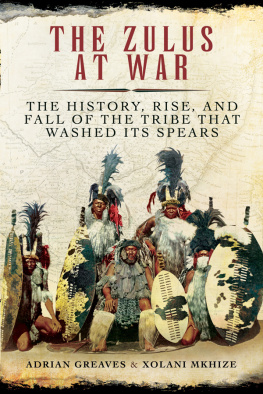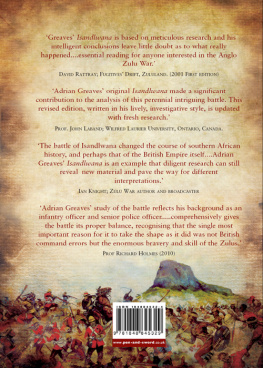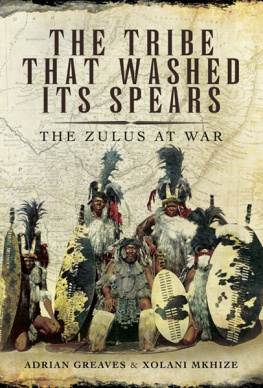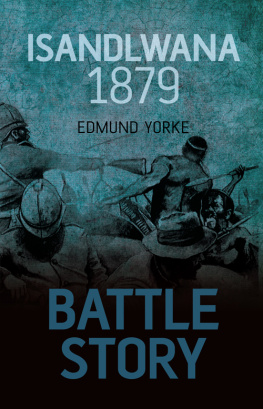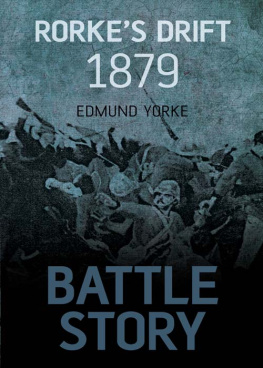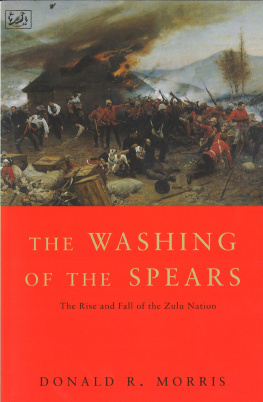Anglo Zulu Part I
Revised Page Proofs
October 2006
Lamorna Publishing Services

First published in Great Britain in 2006 by
Pen & Sword Military
an imprint of
Pen & Sword Books Ltd
47 Church Street
Barnsley
South Yorkshire
S70 2AS
Copyright Ian Knight and Adrian Greaves, 2006
ISBN 1 84415 479 3
Digital Edition ISBN: 978 1 84468 375 8
The right of Ian Knight and Adrian Greaves to be identified as Authors of this Work has been asserted by them in accordance with the Copyright, Designs and Patents Act 1988.
A CIP catalogue record for this book is
available from the British Library
All rights reserved. No part of this book may be reproduced or transmitted in any form or by any means, electronic or mechanical including photocopying, recording or by any information storage and retrieval system, without permission from the Publisher in writing.
Typeset in 11/13 Sabon by
Lamorna Publishing Services
Printed and bound in England by
CPI UK
For a complete list of Pen & Sword titles please contact
PEN & SWORD BOOKS LIMITED
47 Church Street, Barnsley, South Yorkshire, S70 2AS, England
E-mail:
Website: www.pen-and-sword.co.uk
Contents
Glossary
Afrikaans
Afrikaans language spoken by the descendants of the original European settlers at the Cape; predominantly Dutch with the addition of some French, German, Indonesian and local African words and constructions.
Afrikaner descendant of the first predominantly Dutch-speaking white settlers at the Cape. Often known as Boers.
Boer literally a country person or farmer, the common name applied to the descendants of the first white Dutch-speaking settlers at the Cape.
Drift a ford or crossing place.
Laager a defensive formation improvised by drawing wagons into a circle. Also used during the Anglo-Zulu War to refer to an entrenched or fortified position generally.
isiZulu
ibutho (pl. amabutho) Zulu guild, grouped together according to the common-age of its members, providing part time national service to the Zulu kings or to other important amakhosi. Often translated in a military context as regiment.
ikhanda (pl. amakhanda) Zulu royal homestead (literal head, meaning of state authority) serving as an administrative centre and often as a barracks for amabutho.
impi matters pertaining to war, or a group of men gathered together as an armed force.
induna (pl. izinduna) a state functionary or official appointed to a position of authority by the Zulu king or other amakhosi.
inkosi (pl. amakhosi) hereditary chief or ruler.
oNdini/Ulundi alternative versions of the name of King Cetshwayos principle royal homestead, from the common root undi, meaning a high place. The residence was commonly known as oNdini by the Zulus; Lord Chelmsford initially used this version in correspondence but once the campaign was underway took to calling it Ulundi. The battle which took place there on 4 July is generally referred to by this name.
umuzi (pl. imizi) ordinary Zulu family homestead.
Foreword
Like many other Victorian wars, less well-remembered today, the Anglo-Zulu War of 1879 was a bitterly contested and savage war, where prisoners were seldom taken, and which was fought out over rugged terrain and in the extremes of African weather. While the politics of the war reflect an age very different from our own, the human cost remains readily comprehensible. The bald statistics give some impression of the scale of the conflict, small by the standards of suffering of the great European and American wars of the century, yet significant enough to give a shudder even to the greatest military power of the age. According to the official history, a total of over 12,000 British and Colonial troops participated in this hard-fought campaign, of whom seventy-six officers and 1,007 British and Colonial troops were killed in action, and thirty-seven officers and 206 men wounded. At least 604 African auxiliaries were killed fighting for the British a figure that is probably significantly underestimated. A further seventeen officers and 330 men died of disease during the war, and throughout 1879 a total of ninety-nine officers and 1,286 men were invalided from the command for causes incidental to the campaign.
During the six months of the Zulu War a total of 53,851 medical treatments were recorded, most for disease, many for minor injuries, sunburn or stomach disorders, and some for injuries sustained during combat. There were makeshift army hospitals at Durban, Pietermaritzburg, Ladysmith and Utrecht; the doctors were mostly drawn from the Army Medical Department, the support staff from the Army Hospital Corps and a number of civilian nurses who volunteered for the job in England.
While for the British the war was merely one element in their struggle to maintain a global Empire the professional soldiers themselves moved on to other wars, the politicians to other intrigues and crises the impact on the Zulu people was permanent and devastating. It is estimated that over 40,000 Zulu men fought in defence of their country, and as many as 10,000 were killed. In addition the king was deposed, the state infrastructure destroyed, hundreds of ordinary homes burned by the invaders and thousands of head of cattle looted.
The lives of individuals caught up in the war reflected these different realities. The bright burst of headlines that heralded the war produced the inevitable crop of heroes and villains who became household names in Britain, but for most participation in the war was an anonymous affair. The service of the majority of ordinary British soldiers was often recorded in only the briefest of official records, while that of the Zulus was scarcely recognized beyond the confines of their immediate families. Yet the impact of all wars is, above all, a human one, and the purpose of these two volumes is to assess something of that impact upon the lives of a small number of those individuals who took part and, indeed, to assess their impact upon it. It is primarily intended as a companion piece for students and readers of the conflict, and it makes no claims to comprehensiveness. Even to provide biographical details of all British officers who took part whose lives are arguably the best documented would require a much larger work than this. Instead, we offer a selection of experiences which we hope is, in some way, representative, and our criteria for inclusion has, on occasion, been arbitrary. While we have tried to include all of the major figures, the movers and shakers who shaped the conflict, we have also included many individuals whose lives appeared to us particularly interesting or, in the case of the Colonials and Zulus in volume II, could be adequately documented.
We are grateful for the help we have received in researching this work, both from students of the war, and from the descendants of those involved. Lee Stevenson has most generously made available his own meticulous research into the lives of veterans of the battle of Rorkes Drift, while Ian Woodason who runs a website dedicated to the graves and memorials of those who fought in the war also made free with his own inspiring archives. So too did Ian Castle. Ian Knight would like to acknowledge his particular debt to his old friend and mentor, the late SB Bourquin, who first opened a road for him into the green hills of Zululand.




